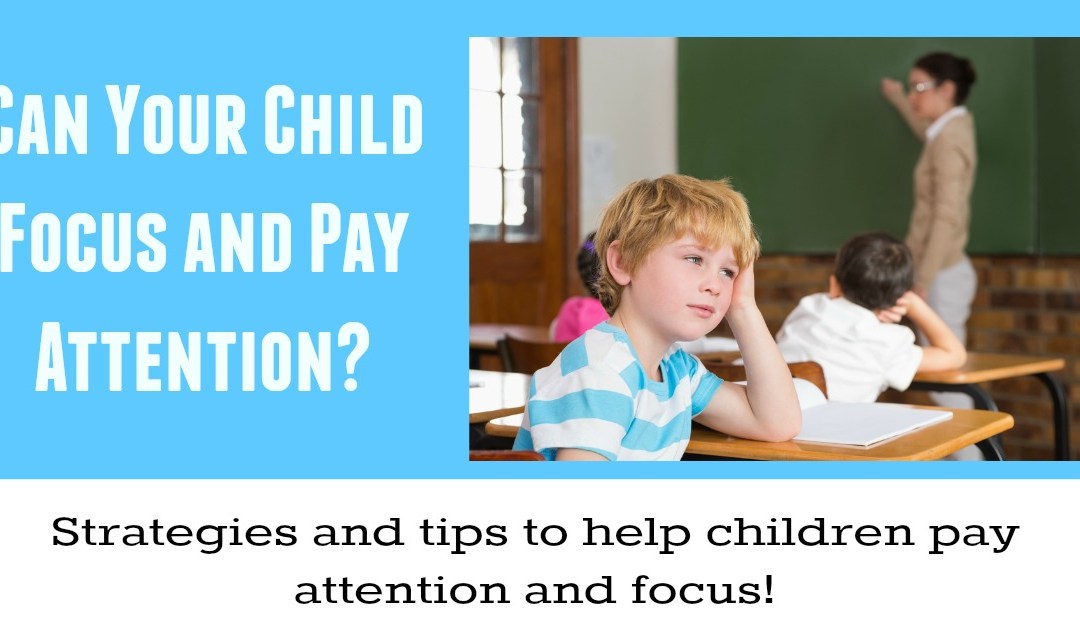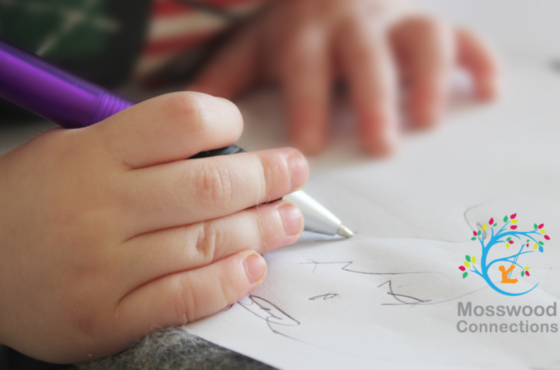Should You be Worried about Your Child’s Regression?
October 31, 2019/ admin / Parenting, Special Needs / 0 comments



Child Regression; when to worry and what to do
“Every day, in a 100 small ways, our children ask, ‘Do you hear me? Do you see me? Do I matter?’ Their behavior often reflects our response.” ~ L.R. Knost
Hopefully, all your children are thriving and not experiencing regression. It has been difficult for us during the past few months. Stay at home orders have affected just about everyone. Schools are having varying successes with online schools. Children miss their routine, they miss their extended family and their friends. I am seeing our clients struggling. Behaviors are becoming more challenging, depression is a real concern. How can we help?
What I am finding to be effective is to allow children to express their feelings. It’s okay to have a bad day. Just let them vent – you can’t change the situation but you can let children know that you hear them and understand. Try to arrange regular virtual “play dates” with their friends. Meet outside at a park (where it is allowed) –be sure to keep socially distanced and go for a walk. Start making plans for the summer. As adults, we know that the plans may never happen but for children, it is a ray of hope. Stay on schedule even when the days start to melt together. Hug each other often!
Signs of Regression
Your potty-trained child all of a sudden starts having accidents. Your talkative child has become quiet. These are just some signs of what can happen in child regression. Worried parents often ask why is their child regressing and become concerned that the regression is a sign of a deeper problem. While extreme regressions, such as losing speech or suddenly being unable to walk, can be symptoms of a neurological or developmental disorder, less extreme behavioral regressions in children of all ages are normal. What you do to help a child through a regression depends on what caused the change in behavior. There are temporary situations and developmental stages that may explain the regression, but it is important to figure out the reason a child regresses so you can give the proper support. Think of a period of regression as a way for the child to communicate their needs and feelings. With a little detective work you can figure out what action if any, you can take to help with childhood regression.
This page contains affiliate links. Please visit our disclosure page for more information.
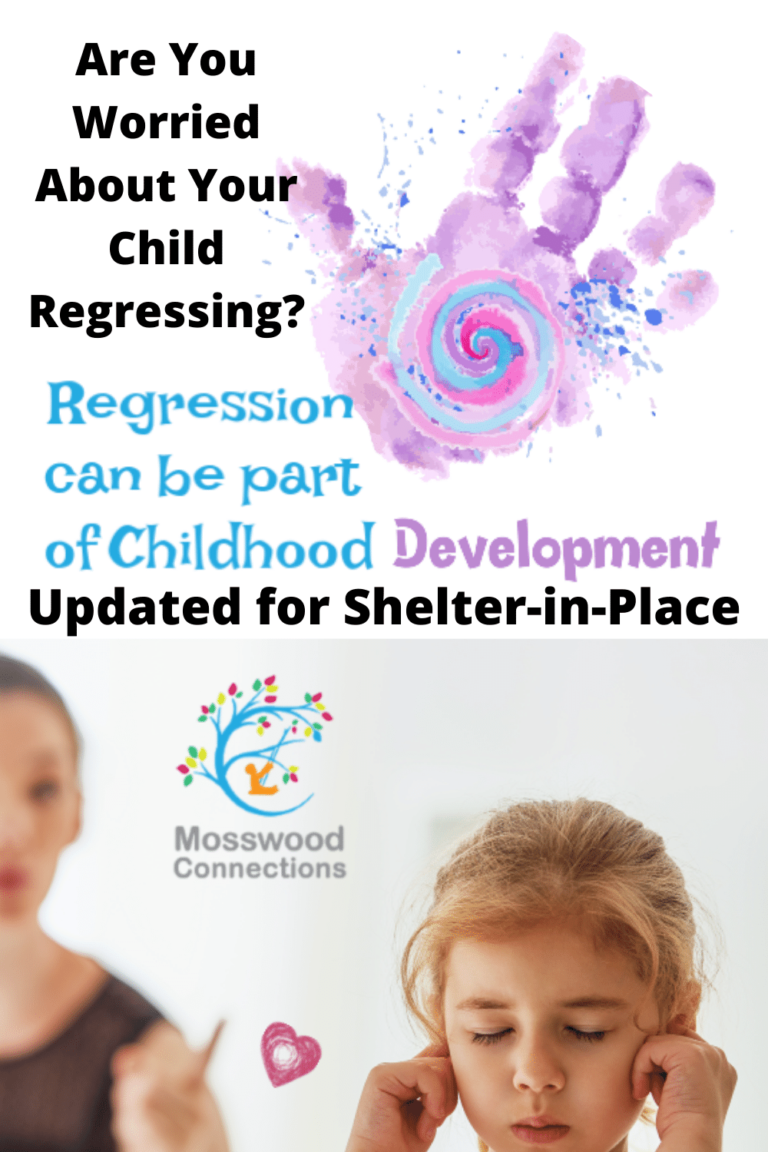
Autism and Developmental Child Regression
Seeing your child regress can be stressful. Many parents worry about autism. Studies show that approximately 20% of cases of children n the autism spectrum experienced extreme regression at around 24 months. “In some children with autism, normal development stalls, often around age 2, and they start to lose many of the communication and social skills they had already mastered.” (Bradley C.C. et al. J. Dev. Behav. Pediatr. 37, 451-456 (2016) PubMed) I have seen this regression myself in an little boy. He had been developing normally, meeting his developmental milestones. His mother asked me to watch for warning signs because his older sister had an autism diagnosis. I noticed how he covered his ears when he was nine months and his extreme separation anxiety but, again, he was progressing at an appropriate rate for his age and he was talking. Then around the time he was 17 months he began spinning toys, bubbles became wondrously fascinating and he lost all the words that he had previously known. This is an example of an extreme regression due to a neurological or developmental disorder. Experts could identify the cause of the regression and the boy began intervention services immediately (fortunately there were therapists easily put into place because of his sister). By the time he was 18 months, this young boy was receiving a host of services; he had his official diagnosis of autism spectrum disorder when he was 23 months old. Recognizing and acting on this child’s regression was key to his future success. Early intervention was effective and he started kindergarten with speech therapy as his only service. Today that toddler is a teen and doing well in high school. Every case will be different but discerning the cause of a child’s regression and responding appropriately will help every child reach their potential.
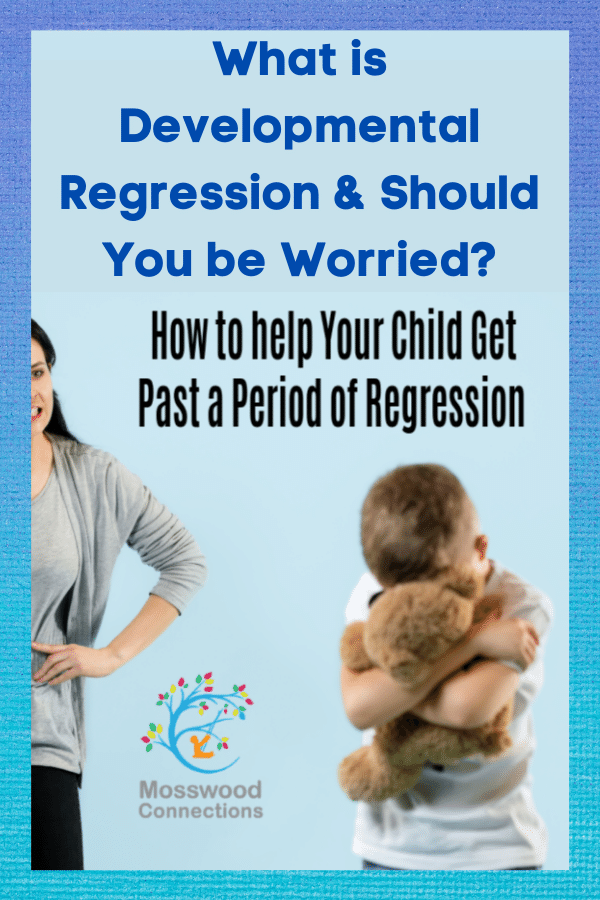
When to Worry about Regression
Child development is not a straight line going up. Rather it is a spiral with natural dips in the curve. It is important to know that mild behavioral regressions in kids are completely normal, and they can happen at any age. According to Sigmund Freud, “regression is an unconscious defense mechanism, which causes the temporary or long-term reversion of the ego to an earlier stage of development (instead of handling unacceptable impulses in a more adult manner). Regression is typical in a normal childhood, and there can be many causes such as stress, increased frustration, or by a traumatic event.”
Most instances of regression are not extreme like the case above that led to an autism diagnosis. Usually, child regression will revolve around losing skills or reverting to immature behavior. Most of the time this regression is temporary and will go away as long as parents and caregivers are compassionate and loving but there are times when intervention is necessary.
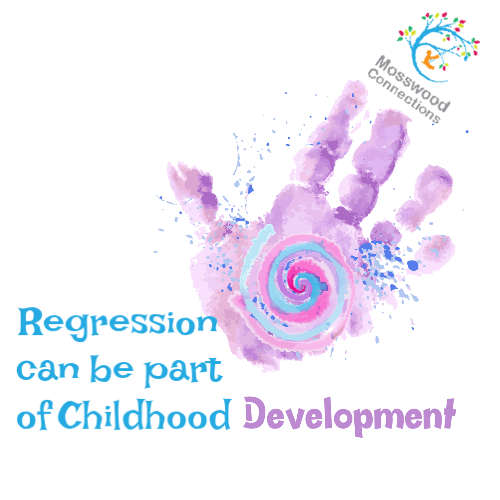
Examples of Temporary Regression
REGRESSIONS CAUSED BY A CHANGE IN SITUATIONS OR ENVIRONMENTS.
When my daughter was 3 we moved and she started having accidents. It was clear that the move had stressed her and caused a regression in potty training. In this instance, we had already planned to support her through this big change. We wrote stories about the move and invited friends from our old town to come and visit. The only intervention left was to be loving and wait it out. The accidents stopped after a few weeks and the developmental spiral started going up again.
Some examples of possible causes for a child’s regression:
- Pandemic: does this need an explanation?
- Moving; the change can be quite unsettling for young children but they will bounce back.
- Developmental changes; There are periods of a child’s development when they go through such a dramatic change that there can be behavioral regression. A six-year-old may stop listening to you as they reach for their own autonomy. An eight-year-old may start to have sleep regression as they experience a rush of hormones and their systems struggle to go from being a little kid to being a big kid.
- A New Sibling; a new baby can sometimes cause older siblings to revert back to babyish behavior as a way of getting attention.
- Going to a New School; any change in environment can send a child back to an earlier stage when they felt secure.
- Illness; we see a lot of regression when a child is sick. After all, who feels like performing when they feel yucky.
- Bad weather; if a child feels scared or stuck inside for too long all sorts of behavioral regression can happen. Wind also has some odd effects on children’s moods. When regression occurs because of temporary situations then make sure that your interactions are loving and compassionate and by using some positive parenting strategies you can help the regression pass quickly. Don’t worry! This is just a part of the parenting journey.
When You Need to Take Stronger Action to Stop Childhood Regression
Some situations of behavior and child regression need intervention. If the environment that a child is in is toxic or not conducive to encouraging a child’s progress then intervention is needed. If a child experiences a traumatic event then professional help is critically necessary. I have two examples of times when stronger action became necessary to stop the regression and get the child back on track.
The first example of severe regression occurred when my brother-in-law died leaving his six-year-old, ten-year-old, and fourteen-year-old sons without a father. Because he died of a terminal disease all three boys had started seeing a child psychologist months before his death and grief counseling began as soon as it was appropriate. The youngest and oldest sons worked their way through their grief but the middle son began to exhibit behavioral regression. He was rude and obsessive, wanting to be in control of everything. Loving support was not helping him move past his regression. It was not until another therapist was brought in to work on PTSD with him that he could move on with his appropriate development. This was a case where the regression most likely would have continued without professional intervention.
The second example involves a third-grade boy on the autism spectrum. Although this child is very bright the large school that he went to can be overwhelming. The school provided quite a bit of support and attempted to be responsive to his needs but every year just got harder and harder for him. When this student with autism started third grade it soon became apparent that the school environment was no longer supporting his development. Despite repeated meetings where we discussed interventions and put them into place, the child continued to struggle. After two months I warned his parents about my concern that his regressive behaviors would only increase if he continued as a student at this school. The day to day grind and heaping amount of worksheets was crushing his spirit. By winter break everyone involved in his case could agree that this child’s regression was reaching a critical stage; the child was shutting down and spending a good portion of his day hiding under his desk. It was time for a change. He left that school and enrolled in a small private school. After a brief period of transition, he began to flourish and grow. His development was back on track and going in the right direction.
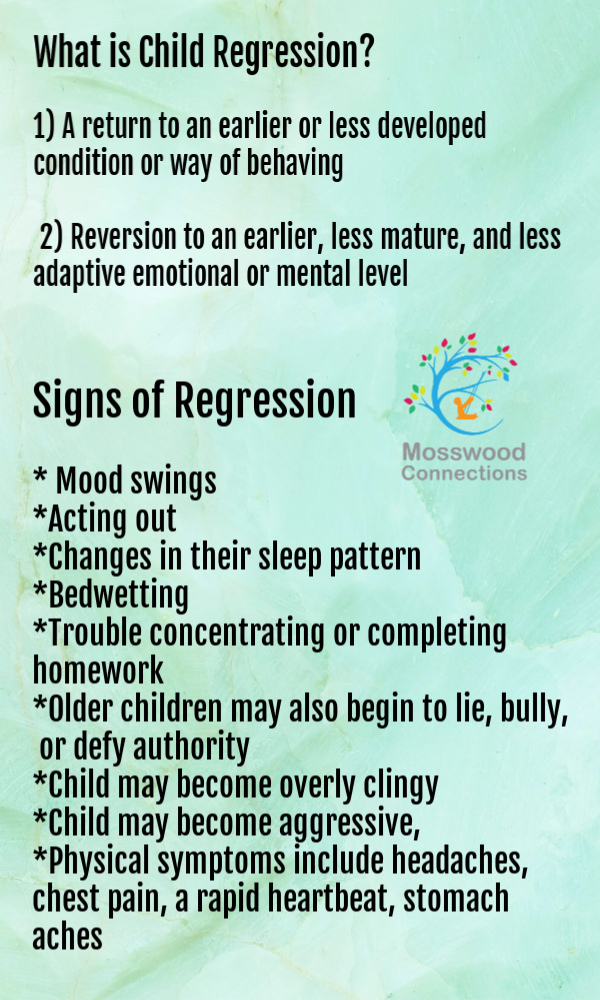
What to do When Your Child Regresses
As parents, we all worry about our children, even when they are doing well so it’s difficult to tell a parent not to stop feeling concerned. The important point to remember is NOT TO PANIC!
- Stay calm and assess the situation. If you can figure out what caused the regression then it will help you respond without getting angry or reactive.
- Create Structure. When children feel out of control they will often act out. A schedule and routine help to give their lives a structure.
- Practice loving patience, be predictable with your expectations, keep your child on schedule and you will ride out this challenging stage.
- Talk with Your Child, help them express their feelings, and model for them how to verbalize complicated emotions.
- Create Social Opportunities. Children benefit from seeing their friends. Find safe ways for them to interact – go for a bike ride, take a socially distanced walk, have virtual playdates.
- Excercise! Exercise can calm the system and help children be more organized. Heavy muscle activities help kids calm and organize themselves so they can focus more easily.
- Spend some extra time with them, children respond well when they interact through play. Have some fun!
When the cause of regression is an event or a temporary situation then most likely the regression will pass quickly and the child will make great developmental progress. Quite often a period of growth follows a period of regression.
When the cause of the regression is more serious then it is time to take action. If the problem is the environment then changing the environment may be the solution, like with the third-grade boy who was disappearing before our eyes. If trauma, neurological, psychiatric, or developmental disorders cause a child to regress then talk to your doctor about getting professional help. There is virtual therapy available during this challenging time. You can find resources on our Mental Health Services page.
Remember you will get through this stage!
Tags ParentingChild DevelopmentRegressionSpecial Needsautism


